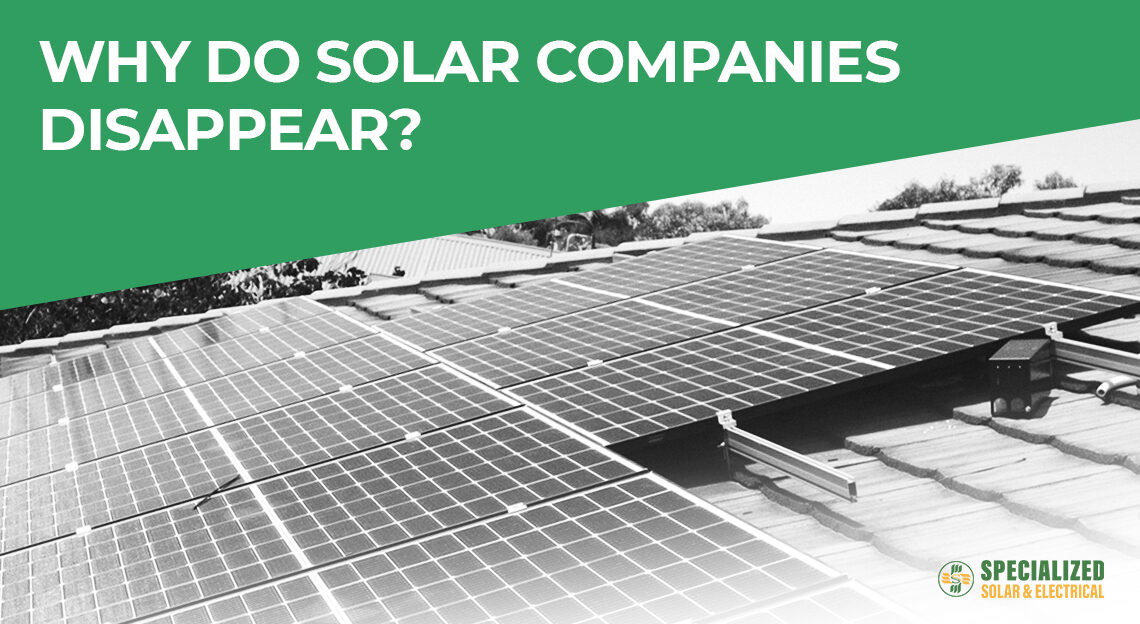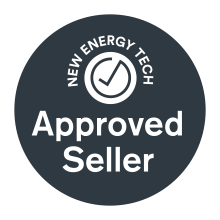Australia leads the world in rooftop solar with over 3 million solar panels systems installed. A staggering 360,000 rooftop solar systems were installed in Australia in 2021, an increase of almost 40 per cent compared to 2020.
Now, more than 1 in 4 Australian homes have installed a solar panels system.
It’s a great result for those Aussie households who are benefitting from lower electricity bills and CO2 emissions. But there is – unfortunately – a downside.
The downside is that, since 2011, over 750 solar installation companies either gone out of business or had a negative change in trading conditions. Assuming each of these companies operated for four years installing 250 systems a year, that comes to over 750,000 Australian solar panels systems that are no longer supported by their solar retailer.
This is a sobering statistic for anyone thinking of installing solar on their home. It means that around 25 per cent of residential solar panel systems are literally ‘orphaned’. An orphaned solar system is one where there’s no solar retailer or installer to back-up the warranties and, in many cases, no recourse to the original manufacturer for warranties either.
So how do you avoid this situation happening to you?
This post looks at:
- Why so many solar companies have gone bust.
- How to choose a solar retailer that’s likely to be around for the long term
Why so many solar companies have gone out of business
Poor quality product and installations
Whilst standards in the Australian solar industry are improving, there are a still some solar companies taking shortcuts to make a fast buck.
When you see cheap prices advertised for solar systems, it’s a warning sign that the quality may not be up to standard.
One way that low-cost solar companies compromise on quality is to use cheap, low-grade components for isolators, wiring and cabling. There are no Clean Energy Council (CEC) accredited lists for these products, making it easier for solar companies to skimp on quality. Fortunately, the CEC has implemented approved lists for solar panels and inverters but even then, faults with approved products occur, and it can take time before they are removed from the list. When this happens, some unscrupulous operators take the opportunity to dump these faulty products on the market at super low prices.
Another major problem is installation quality. Low-cost solar operators cut prices by squeezing solar installers on margins. They farm out the installation work and push subcontractors to work for the lowest rates. In turn, installers try to compensate by installing three or even four solar systems in a day to make ends meet. This, of course, is a recipe for a low-grade installation and a high risk of system failure down the track.
Part of the problem is inherent in the system, i.e. the way in which solar companies are paid. Around 30-40 per cent of the money solar retailers make on any solar panels system is from Small-scale Technology Certificates (STCs), a form of rebate from the federal government. STCs work as a point-of-sale discount for the customer and are claimed by the solar retailer once the system is installed. Regardless of whether you’re getting the best quality panels in the world, or the cheapest ones straight out of China, the value of the STCs is the same. Dodgy solar companies have wised up to this. They use the cheapest panels and inverters to win as many sales as possible – and make their margin on the high-paying STCs.
Retailers not intending to repair
All solar companies must provide a workmanship warranty protecting the customer from:
- any fault in the system caused by the products supplied
- any defect in the system caused by workmanship during installation
- rectification of any damage to your property or leaks caused by the system or the installers.
The industry standard for the workmanship warranty is five years. Solar companies cutting corners on quality often do so with the intention of closing before they get hit with too many warranty claims. What tends to happen is that they go into business for a couple of years, then fold. That way they don’t have to bear the costs of any warranties.
Saving costs on customer service
There are multiple steps involved in installing a solar panels system from gaining approval from the network distributor to organising the electrical safety inspection and providing the electricity retailer with the paperwork to set up the feed-in tariff.
With a good solar company, these steps will happen smoothly in the background; you shouldn’t notice any delays. However, if you choose a low-cost solar company, chances are their customer service staff will be cut to the bare bone. The result will be a lot more hassle for you during the installation process and, quite possibly, a lack of after-sales service with any support or warranty claims you may have.
One-man installers follow the rebates
Different states offer different solar rebates at different times. For one-man installers, packing up shop and moving interstate to follow the rebates is easy. They simply liquidate their business and emerge as a new business entity in the next state. The problem of course is that they leave their customers high and dry with no support for their system.
Phoenixing
The Australian solar industry is known for illegal ‘phoenixing’. This occurs when a director of a company winds up his or her business and forms another company under a new name. This new company provides the same products and services, without any of the debts or liabilities of the previous entity.
Due to weak legislation, it’s all too easy for a business to phoenix – leaving its customers in the lurch without any warranty support.
In the last few years, some of the biggest names in the Australian solar industry have played this phoenix card causing financial stress and a lot of hassle for their stranded customers.
How to choose a solar retailer that’s likely to be around for the long term
There are several checks you can make to increase the likelihood that the solar company you appoint is reputable and will be around to honour the warranties on your system.
- Check they have a trading record for 5-10 years under their ABN or CAN using the ASIC Connect website. Also check the ASIC register of insolvency notices.
- Make sure they are a Clean Energy Council Accredited Solar Retailer as this demonstrates they comply with industry best practices and responsible sales and marketing. CEC Accredited Solar Retailers also have to provide an installation workmanship warranty of at least five years.
- Ask if they employ Clean Energy Council Accredited Solar Installers and request details of the installers number to check against the list on the CEC website.
- Check, if possible, the number of employees they have. One-man bands are to be avoided where possible due to the ease with which they can close and start up again.
- Make sure they are quoting you for reputable solar panels, solar inverter and components for the rest of the system. Solar panels must be on the CEC approved list, likewise solar inverters. Check that the fine print doesn’t allow for them to be swapped.
- Ensure solar panels and inverters meet or exceed industry standard warranties. The same for installation workmanship. Ideally find a solar retailer/installer who provides more than 5 years on the workmanship; 10 years will give you much greater peace of mind.
- Find a solar retailer who provides a whole-of-system performance guarantee for at least 10 years. This guarantees the solar power generation from your system – with no risk to you.
- Look for evidence that they are winning big commercial tenders or working for councils. If they are, that’s a sign they are financially stable and competent.
- Check out their independent reviews – like Google Reviews – and find a solar retailer who has lots of them, with the vast majority positive. Read them to see how the company has handled any issues; that’s always going to be telling. If you want more proof, ask for contact details of customers you can speak to about their solar installation.
Get in touch
If would like expert advice and an obligation-free quote for solar or battery storage, get in touch.
Specialized Solar & Electrical is a Clean Energy Council Accredited Solar Retailer that’s been in the solar industry for over 15 years, with the last seven under our current ABN. We have thousands of happy residential and commercial customers and we are the exclusive Solar Retailer and Installer for major solar bulk-buys supported by several councils in Victoria.
We only supply lead brands and provide customers with a minimum 10-year installation workmanship warranty and 10-year whole-of-system performance guarantee.
We employ teams of CEC Accredited Solar Installers and we are a Registered Electrical Contractor.
We’d love to chat to you about solar. Give us a call on 03 9117 6185 or complete our online enquiry form below.












